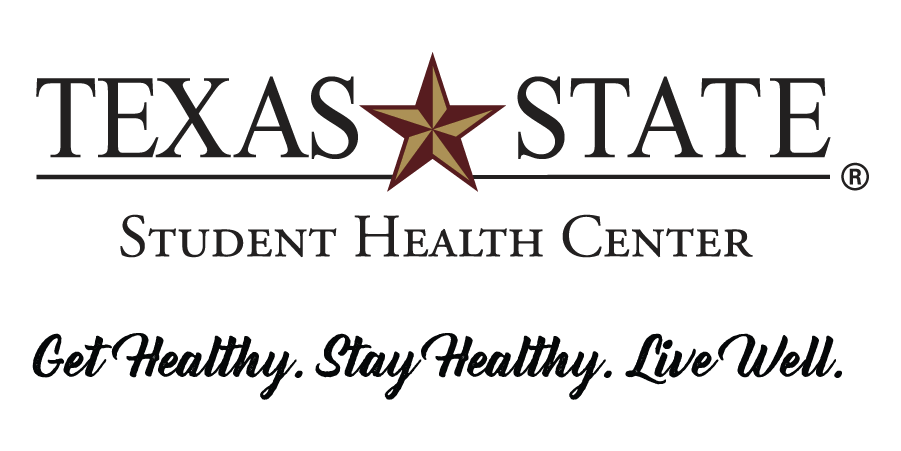Informational Articles
Informational articles are a great way to read more about the resources and services offered to students. Each month we will feature a new service or department at the university to share more information on how these resources help students throughout their college journey.
-
Fraternity and Sorority Life
Fraternity and Sorority Life (FSL) began at Texas State in 1903 with various Literary Societies, including the Harris-Blair Literary Society, whose members included former US President and Texas State Alumni Lyndon B. Johnson. In 1957, these Literary Societies began to adopt Greek Letters for their names and in 1963 the organizations became affiliated with national fraternities and sororities that maintained headquarters from around the nation.
Encourage your student to get involved with Fraternity & Sorority Life (FSL) at TXST! FSL has an average of 2,000 Texas State students who participate in fraternities and sororities each year on campus. Joining a fraternity or sorority can benefit your student in a number of ways including leadership opportunities, academic support, brotherhood/sisterhood, social engagement, a sense of belonging, and community involvement and service. Texas State FSL students are active on campus and in the San Marcos communities, and they regularly support local nonprofits such as School Fuel and the Southside Community Center. On average, Texas State FSL students have higher GPAs than students not affiliated with an organization. In addition to their philanthropic and academic endeavors, FSL organizations also provide students with a sense of community through fun social events involving campus engagement including but not limited to: Multicultural Greek Council showcase, hump days, athletics events, and more.
Texas State's FSL community is made up of 30+ chapters across four governing councils:
Interfraternity Council (IFC)- All male organizations
Multicultural Greek Council (MGC)- Multicultural interest organizations
National Pan-Hellenic Council (NPHC)- Historically Black fraternities and sororities
Panhellenic Council (PHC)- All-female organizations
To learn more about the councils and chapters, visit the Office of Fraternity and Sorority Life website.
Written in conjunction with Elizabeth Ayala from the Fraternity and Sorority Life Office.
-
University Police Department
Safety on campus is key to fostering an enriching, vibrant and diverse learning community at Texas State University. The University Police Department at TXST is a loyal partner in promoting safety through community engagement, round-the-clock patrols, a mental health liaison, and training opportunities for students, faculty, and staff.
"UPD is always here to serve our community. It is important that families are just as aware as students of how accessible and ready to help our team is,” said James B. Dixon, Interim UPD Chief of Police.
Round-the-Clock Patrols
Chances are students will spot a UPD officer on campus in their daily routine. This is a good time to say hello and get acquainted with the team and ask any questions about their role on campus. The team is focused on protecting the Bobcat community and responding to any calls that may arise during the day or night. UPD is always here.
Contact & Follow UPD
Emergency: 911
UPD Non-Emergency: 512.245.2805
UPD Email: police@txstate.edu
Website: police.txstate.edu
Instagram
Twitter
Safety Resources
UPD at TXST takes seriously the importance of sharing resources, tips, and ideas for staying safe with students. There are several safety preparations students can take even before they step on campus. UPD shares these Top 5 Safety Tips for Students as an easy online reference. Students can sign up and also add their family member email address to the TXState Alerts, an important emergency notification system at the university.
Community Engagement
Being a part of the Bobcat community is at the heart of the mission of UPD. Officers enjoy the college campus vibe and the unique nature of a university as diverse as TXST. Opportunities to engage with UPD include the Student Police Academy, Popcorn with the Police, Paletas with the Policia, and Coffee with the Cops among other firsthand and fun encounters with officers. The newest program is Chat it Up with the Chief, an opportunity to have lunch with the chief and bring up any topic for a casual conversation. UPD Events provides the latest dates and times for community engagement opportunities.
UPD Mental Health Liaison
UPD at TXST is leading by example with the addition of a Mental Health Liaison, Officer Jessica Kinney. She is central to UPD’s holistic response to any call for service at TXST.
"We talk to our students every day. They share with us how the last year has been stressful and they also reach out when the rigors of university life start getting to them. We are here to listen, get them help when necessary and facilitate available resources,” said Kinney.
Here for You
The UPD team is passionate and dedicated about keeping the campus community safe. Students are welcome to stop by anytime at UPD headquarters in the Nueces Building, 615 North LBJ Drive, San Marcos, Texas 78666. There you will find officers ready to serve and support students on their path to success at Texas State University.
Written in conjunction with Deyanira Romo Rossell from the University Police Department. -
Counseling Center
Focusing on mental health can be vital during one’s college career. Oftentimes there are misconceptions that one needs to be at a psychological breaking point to seek help. However, the Counseling Center provides a wealth of resources to aid students in recognizing signs of mental health distress before problems intensify and help well-adjusted students reach their highest academic potential. The Counseling Center provides the following resources to currently enrolled students:
Prevention and Outreach
Students can complete the Kognito At-Risk training, which helps students recognize signs of distress in others and ways to approach them to offer support and resources. In addition to classroom and student organization presentations, the Counseling Center offers a schedule of workshop and webinars focused on topics related to collegiate mental health.
Self-Help Resources
Students have busy schedules balancing school, work, and social activities. Therapy Assistance Online (TAO) is an interactive, easy to use, platform available 24/7 that consists of short videos and skills-based exercises to help students build coping skills for concerns such as depression, anxiety, and more.
Bobcat Mental Wellness Videos feature a bank of recorded presentations recorded by our professional staff that features topics such as perfectionism, stress management, mindfulness, and building healthy relationships.
Here are more self-help resources, All Self-Help Tools and Resources.
Therapy Services
Services include time-limited individual counseling, group counseling, limited couples counseling, and crisis response. In addition, our referral resources can help assist students with connecting to off-campus counseling services. Our website contains guidance on making an initial appointment.
Keep in touch! Parents and families can stay up-to-date by reviewing the Counseling Center website and by following us on social media using the handle @txstCC.
Written in conjunction with Dr. Richard Martinez from the Counseling Center. -
Student Involvement
Though this semester may look a little different than we expected, there are still opportunities for Texas State students to connect with others; both virtually and in-person. Student Involvement offers numerous ways to get involved on and off-campus. Whether it be by attending an event, joining a student organization, or engaging in service opportunities, Student Involvement can direct your student to opportunities to engage and connect with other Texas State students, faculty and staff.
Events Calendar
Student Involvement hosts a variety of events and activities for Texas State students to engage in throughout each long-semester. Students can view upcoming events using the events calendar. The events on this calendar are planned and implemented by the Student Involvement department and the Chartered Student Organizations (CSO), which are student organizations directly affiliated with Student Involvement.
Join a Student Organization
In addition, students can search organizations that fit their interests by browsing the database of over 400+ registered student organizations. Here, they will be able to view the type, description, meeting day, and contact information of each organization.
Bobcat Involvement Database
Students are also encouraged to use Bobcat Involvement, an additional tool which connects students to organizations specific to their interests (e.g. leadership, service, fraternity/sorority, and student government).
Student Involvement recognizes the importance of finding a sense of belonging, community, and providing students with opportunities to experience new things. For more information about Student Involvement, they are available by phone at 512.245.3219 or email getinvolved@txstate.edu. The Student Involvement front desk is located on the 4th floor of LBJ Student Center in case your student would rather talk with someone in person.
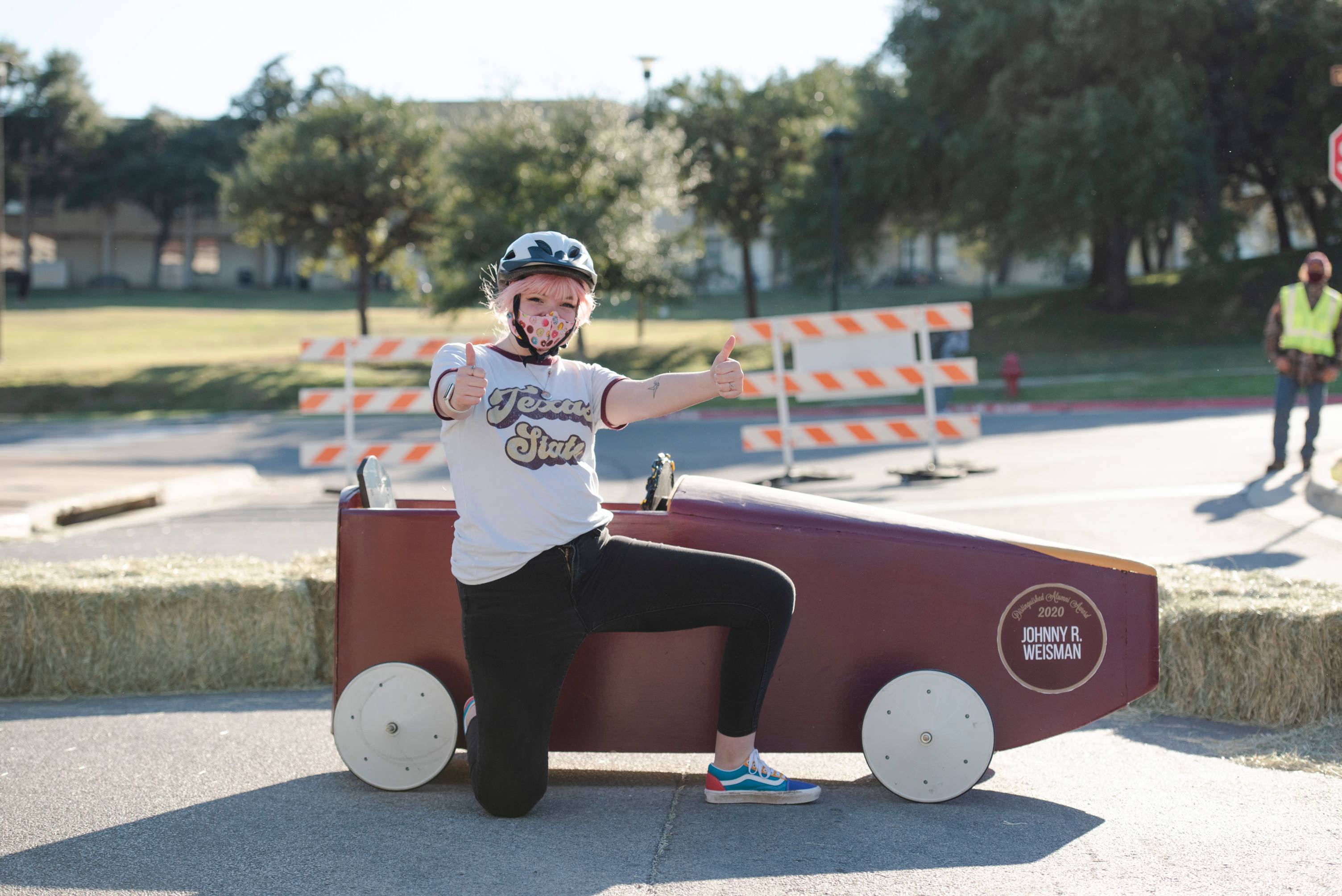
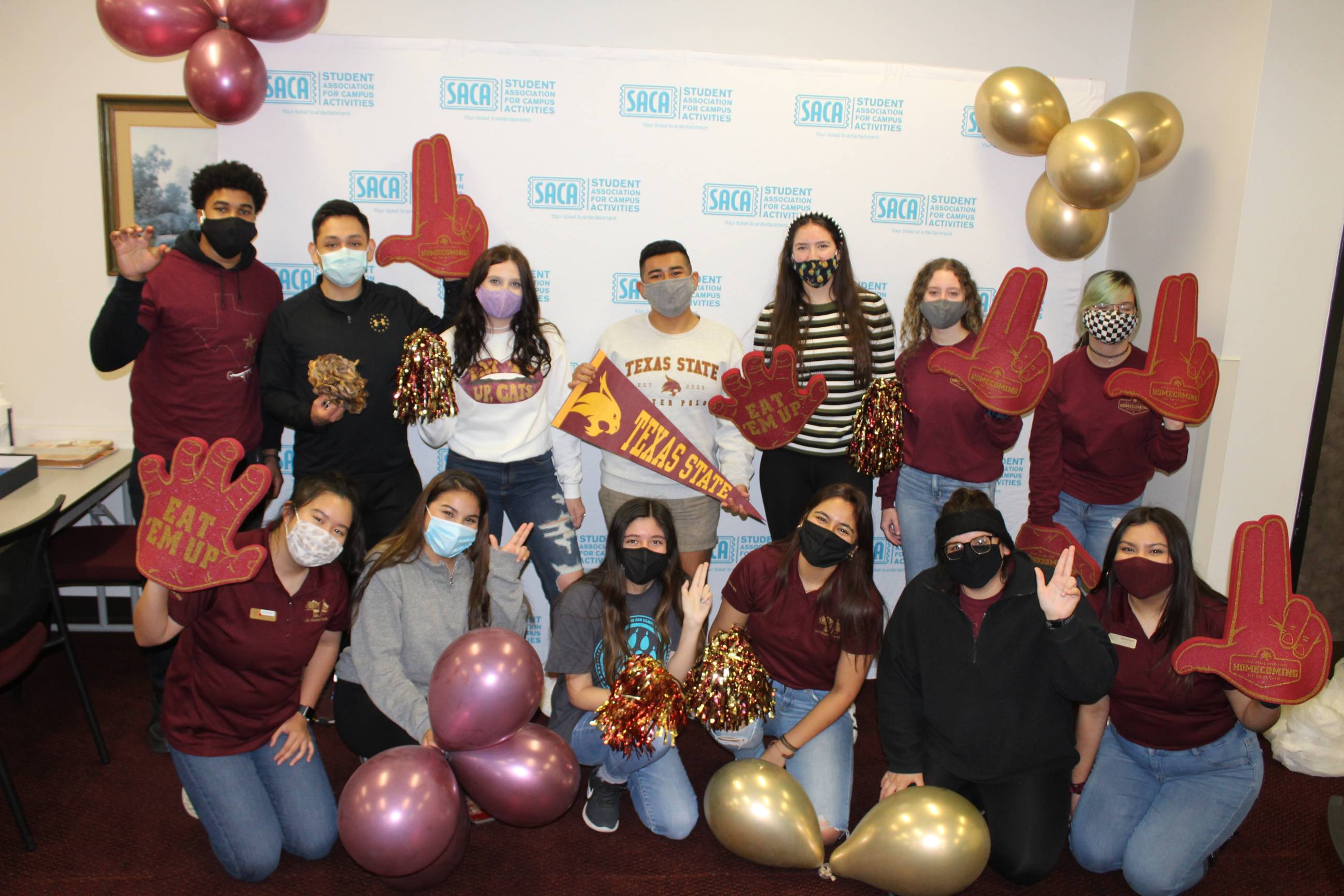
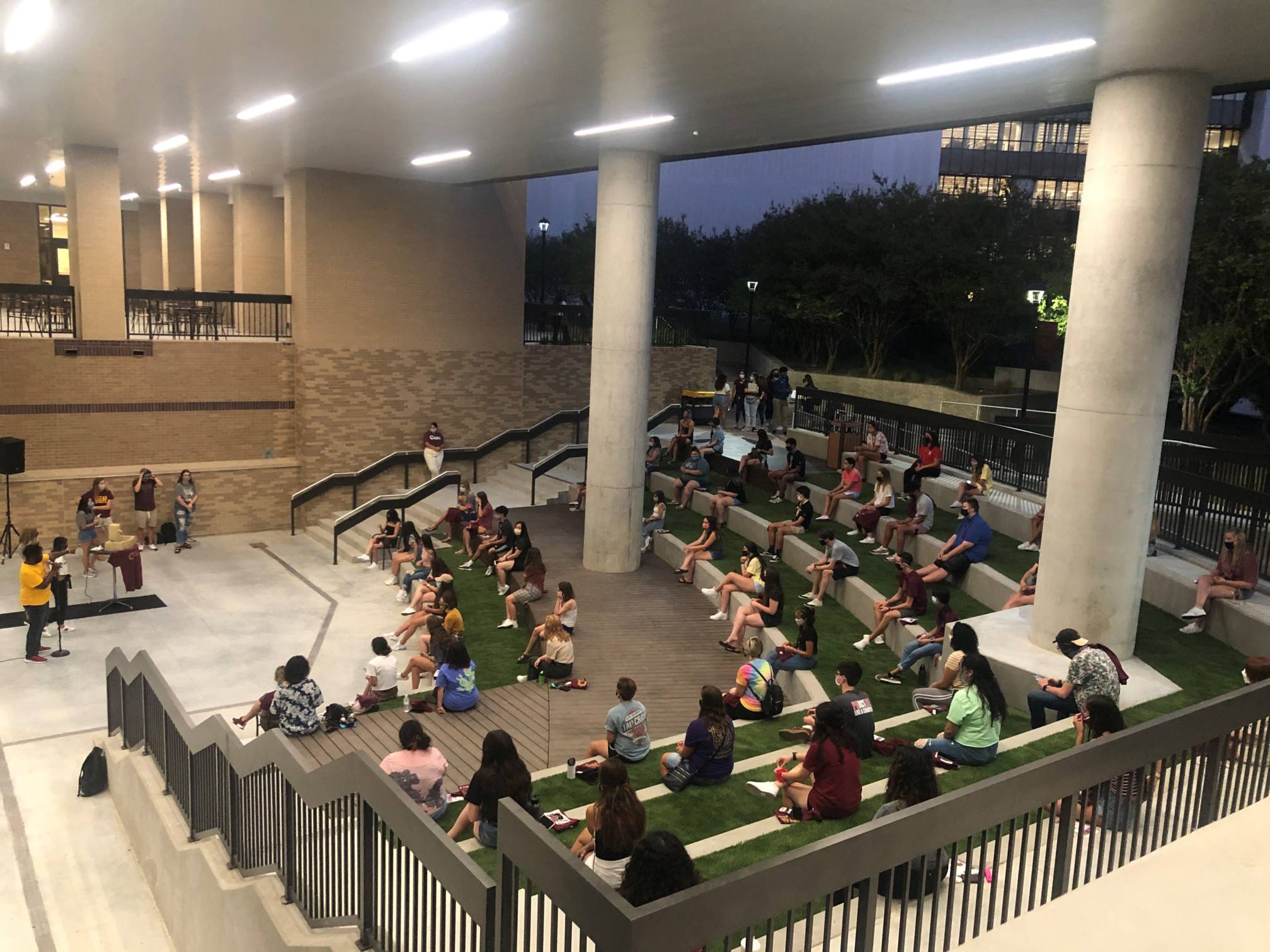
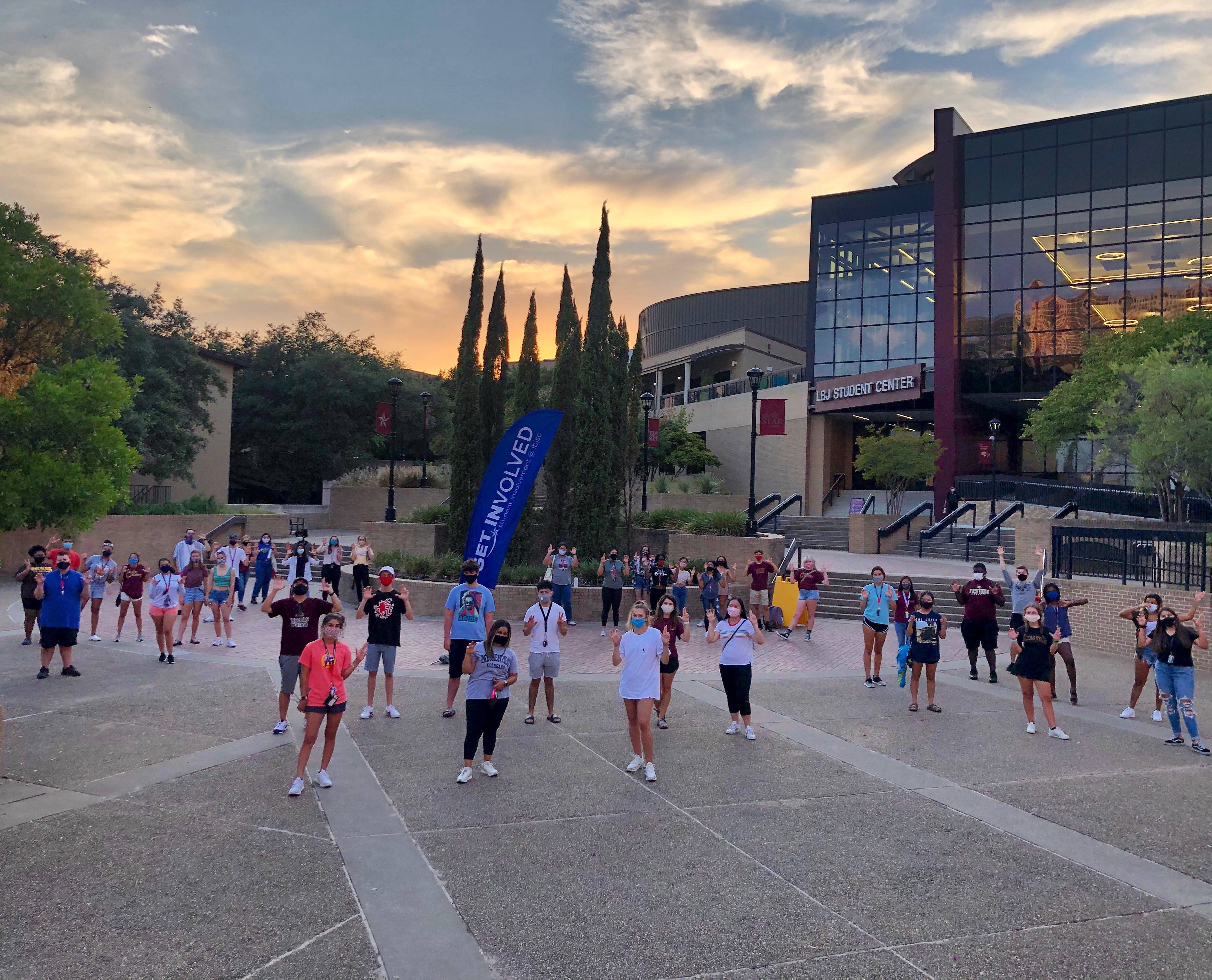
-
Leadership and Service
Leadership and Service is a centralized leadership development center for your student. Housed under Student Involvement, the Leadership and Service offers a multitude of programs designed to help students identify their values and leadership style, grow in their interpersonal skills, and explore the ways they can make an impact on their community. Whether they're a seasoned student leader, or someone just starting on your leadership journey, the Leadership and Service team is here to help learn, grow, and serve.
How can my student make the most of the Leadership and Service area?
Students are able to participate in our available programs at any stage in their academic career! To plan ahead for this, your student visit the Leadership and Service website to view available programs, our events calendar, and see how to contact our office.
What does the commitment look like for your student?
Our programming is designed to fit fluidly within each student's academic schedule. In semesters where they have a heavy course-load, they're free to attend our workshops or film series whenever their schedule allows. Our Capstone and Pathfinder programs involve a 3-hour time commitment each week for 6-8 weeks, and are offered each semester to accommodate students’ busy schedules. Students are encouraged to contact a member of our staff to receive advising in order to plan how to fit leadership development into their schedule.
Where can my student and I learn more?
You can read more about our leadership philosophy and programming on the Leadership and Service website. You can also follow us on Instagram and Twitter for daily inspiration and motivation: @txstleadership.
Maybe your student has never thought about themselves as a leader and wondering if we're really for them. We say absolutely! Our philosophy is that leadership is a relational process, rather than a title, position, or even an identity. We believe all students (and people for that matter) can benefit from thoughtful reflection and exercises to grow their leadership skills. Each year we serve hundreds of students – many of whom are just beginning their leadership journey!
For more information on the Leadership and Service area, feel free to reach out to getinvolved@txstate.edu or call 512.245.3219.
Written in conjunction with Ramces Luna from the Leadership Institute.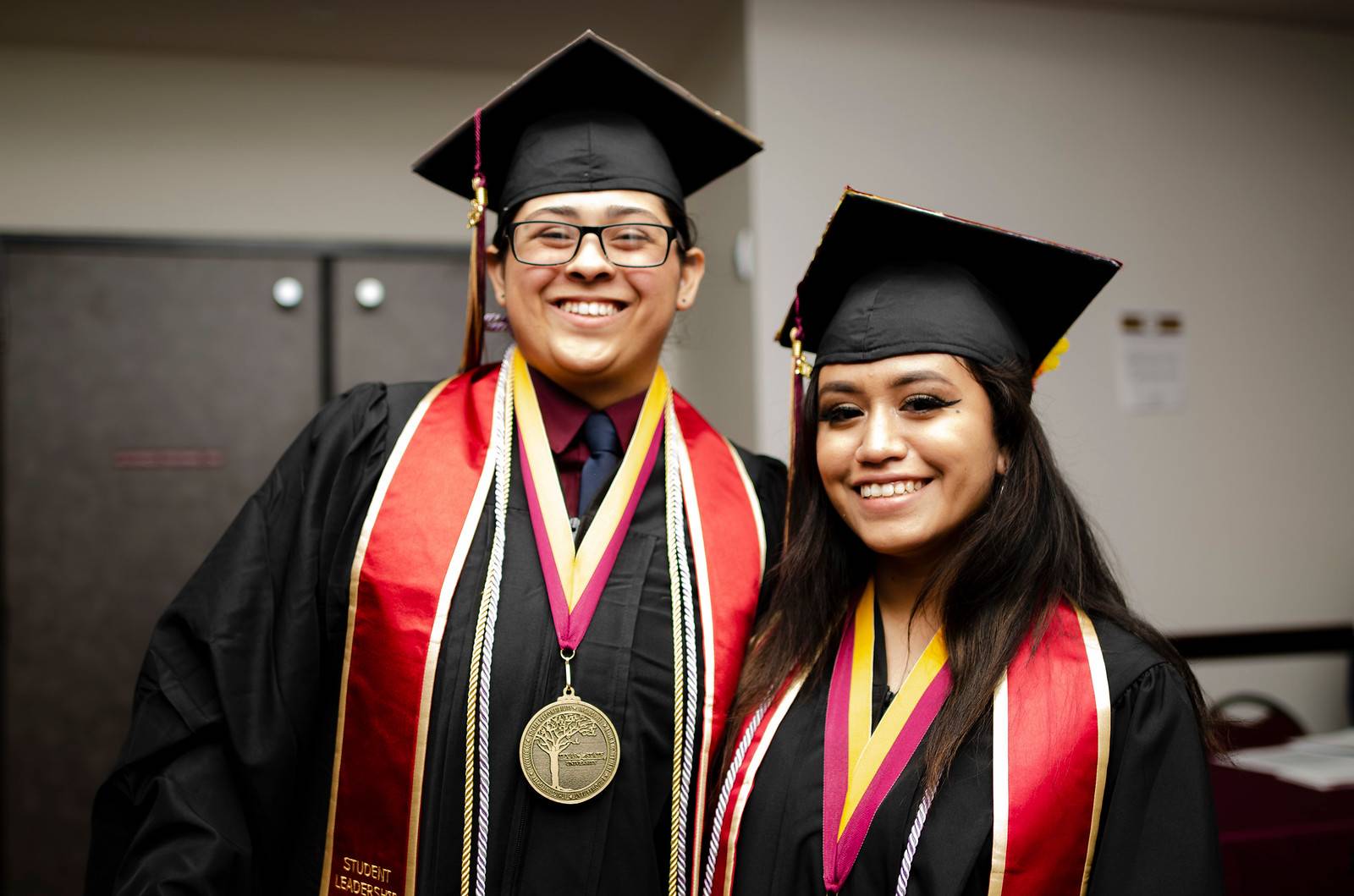
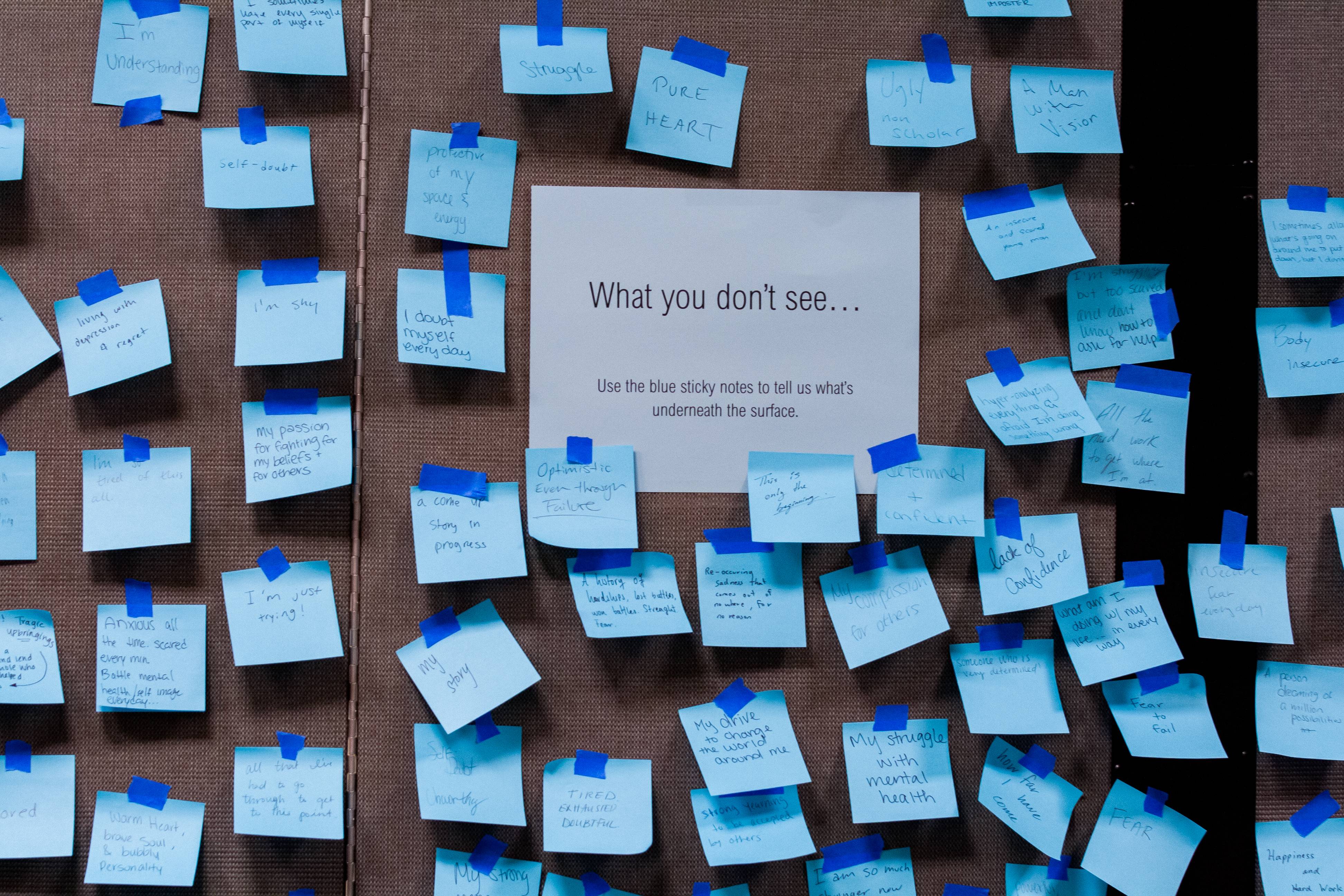

-
Academic Support
Texas State has many academic resources available to help students succeed in their courses. If your Bobcat is looking for additional help with understanding a subject or working on an assignment for class, encourage them to utilize the resources available to students.
Student Learning Assistance Center
The Student Learning Assistance Center, better known around campus as SLAC, is a multi-faceted academic support program for all Texas State students. SLAC provides tutoring services, supplemental instruction, learning and study skills workshops, and learning specialist consultations free of charge. SLAC is a place where tutoring is provided by students specializing in accounting, science, writing, statistics, history, math, and more. In addition, SLAC offers subject area assistance with easy access to convenient reference sheets, popular online sites, and commonly used applications for mobile devices.
SLAC is located on the 4th floor of the Alkek Library and is also available through Zoom virtual tutoring. SLAC tutoring is given on a drop-in basis, so no appointment is required. For more information, visit the SLAC website.
The University Writing Center
The Texas State University Writing Center offers free help and tutoring for students’ writing projects, from basic essays to doctoral dissertations. The Writing Center helps all students develop their writing at any stage of their writing process, in any style guide, and in any discipline. If students have not started writing yet and want help getting started, if they have a first draft, or a final copy of their work, the Writing Center is available to help.
This service is free for students to use, and students can have up to 50 minutes of appointments per day. Currently, the University Writing Center is in an online format. Students can make virtual appointments. For more information, visit the University Writing Center website.
Math CATS
Texas State University Math CATS, sponsored by the Department of Mathematics, provides free math tutoring in a personalized atmosphere. Tutors are available to help students with understanding of the materials and assistance with homework. Math CATS supports academic growth by increasing skill competence, raising achievement in math coursework, and instilling confidence in students' mathematical abilities.
Currently, Math CATS is in an online format. Math CATS has a virtual drop-in service and offers virtual tutoring by appointment. For more information, visit the Math CATS website. -
Career Services
Career Services is a valuable resource to share with your student, no matter what career stage they’re in. Whether deciding on a major, choosing a career field, applying for jobs or internships, or considering graduate school, Career Services can help. Career Service’s website is easy to navigate on a mobile device or computer and includes an abundance of helpful and convenient resources. Additionally, students can drop into their centralized office on the fifth floor of the LBJ Student Center for basic resume and interview support or schedule an appointment for more extended career-related discussions. Career Services also hosts several events each semester that help connect students with employers and teach career success skills.
Services Provided by Career Services Include:Career Counseling: If your student is still deciding on their career, meeting with a career counselor is a great place to start. Career Counselors have master’s-level training in counseling and student development and understand the stress and anxiety that often accompanies career decision making. Their goal is to help students navigate their path, while guiding them through the process of making informed and confident career decisions. Career Counselors can also assist with resume reviews, cover letters, interview preparation, graduate school application documents, and much more.
Career Advising: If your student has a firm understanding of their career goals and wants to know the best strategies to get there, meeting with their Career Advisor is a helpful next step. Each Career Advisor works with specific majors within the university’s colleges to provide information relating to their field of interest. Career Advisors can also help tailor resumes to specific jobs and industries, provide resources for a job and internship search, and help students develop a strategic career plan. Your student already receives weekly emails from their Career Advisor, with tips and updates on career-related events. Our motto, to pass on to your student, is: “Read `Em before you Delete `Em!”
Career Peer Advising: If your student is in hurry and may only need quick guidance before heading to class, Career Peer Advisors are available for 15-minute drop-in meetings, Monday through Friday from 9:00 a.m. to 5:00 p.m. Career Peer Advisors are student workers trained to assist with general resume and cover letter reviews, interview preparation, part-time job search assistance, and support using Handshake, Career Service’s internal job-search system.
Career Fairs: Career Services hosts more than 20 career fairs each year, where students can connect with employers and learn more about internships and job opportunities from a diverse set of local and national employers. Fairs range from All Majors Career Fair, with employers seeking a variety of majors, to fairs geared towards specific fields, such as STEM, business or teaching. Many employers attending the fairs also engage in on-campus interviewing, where students can interview in a centralized and comfortable location within the Career Service’s office. Please be sure your student reads the weekly emails from their Career Advisor and follows them on social media for updates on upcoming events.
Additional Services:
- Professional headshots for LinkedIn
- The Career Closet for students needing to borrow professional clothing for interviews
- Bobcat Career Chats, informational sessions presented by various employers
- And much more!
For more information on Career Services, visit their website or call 512.245.2645.
Written in conjunction with Emily Hawarny from Career Services. -
Campus Recreation: An Essential Component of the Bobcat Experience
Whether your student is searching for workouts in an indoor gym, a presence of nature on-campus, or the full immersion of the outdoors at University Camp, Campus Recreation creates a unique Texas State experience. As your student begins their journey at Texas State University, it is a common thread among students that schoolwork can be very demanding. With these demands comes a need for self-care and time away from the books, and Campus Recreation offers great opportunities to support students through programs and services that promote overall success!
The Department of Campus Recreation provides services and activities throughout their on- and off-campus sites. Services provided by Campus Recreation support key development in leadership, communication, community involvement, and well-being as a priority. While being away from class or work, Campus Recreation ensures that these opportunities can reduce stress, enhance focus, and improve academic performance. Areas of operations for Campus Recreation are the Student Recreation Center and Outdoor Center both located on the San Marcos campus, the Campus Recreation center on the Round Rock campus, while University Camp is located in Wimberley, Texas.
Services provided by Campus Recreation include:- Intramural Sports and Sport Clubs- These programs offer extracurricular activities that can lead to creating fun, memorable experiences while socializing with other students of the university
- Adventure Trips- The Outdoor Center offers a variety of different adventure trips that travel to different parks and offer outdoor education opportunities
- Group exercise classes- Students can participate in exercise classes which include Zumba, Sweat & Strength, Kickboxing, and much more
- Equipment rentals for the river- Students can rent kayaks, paddleboards, canoes, and tubes to explore the San Marcos River
- Climbing Center- Features two 54’ climbing towers and a large bouldering area which totals over 2,600 square feet of climbing terrain
As firm believers in the growth and advancement of our students in a higher education setting, these outcomes are not possible without the fundamental component of the Campus Recreation program.
Written in conjunction with Jonathan Hernandez from Campus Recreation. -
Financial Aid and Scholarships
Financial Aid and Scholarships helped nearly 28,000 students and their families with over 373 million dollars in aid last year, and they are ready to help your student too! Knowing a few pro-tips will really help students and their families realize their goals.
Pro-Tip 1: First things first, you and your student need to fill out a FAFSA. This Free Application for Federal Student Aid should be filled out as soon as possible on or after October 1. We encourage students to try to have the FAFSA finished by Halloween, but it isn’t scary! In fact, there is now a free mobile app called “myStudentAid” that can be found in the Apple App Store or Google Play. The FAFSA will let the Financial Aid and Scholarships Office know what sort of aid a family might receive to help pay for school. If you did not get it finished by Halloween, don’t panic; get it done as soon as possible. For those who are not eligible to file the FAFSA and are eligible for state aid, the TASFA should be filled out early as well.
Pro-Tip 2: Know what it costs to attend Texas State. Visit the Cost of Attendance website to get an idea on what costs to expect and what financial aid will cover. Although the Financial Aid and Scholarships office does have an average cost, there are variations that factor into the cost. Housing and meals can be a huge part of college, but it is also where the family has some control over costs. Students should consider modest housing and meal plans to minimize their costs.
Pro-Tip 3: Get help if you need it! For specific questions, please email the Financial Aid and Scholarships Office at financialaid@txstate.edu or call at 512.245.2315. Financial Aid advisors are available Monday through Thursday from 8:00 a.m. to 5:00 p.m. and Fridays from 9:00 a.m. to 5:00 p.m. If you need financial coaching, they do that too. In fact, the single most powerful financial education tool offered at Texas State University is free, certified, professional financial coaches. They can help Texas State families navigate financial options, plans, and goals associated with going to college. This service can be found on the financial education page, BobcatGold. And while you are there making an appointment to speak with a financial coach, sign into iGrad for scholarship opportunities, advice, and excellent information about personal finances. Grow your financial future today!
If your student is looking for other ways to fund their education, the Bobcat Online Scholarship System (BOSS) is up year-round and allows students to use one application to apply for as many Texas State scholarships as they’re interested in. Students can check the criteria and deadlines specific to each scholarship on the BOSS website.
Written in conjunction with Dr. Byron Kerr from the Financial Aid and Scholarships Office. -
Student Health Center: A Healthy Bobcat is a Successful Bobcat
As a parent or family member, we know it's stressful when your Bobcat gets sick while they're away from home. Your student doesn't have to travel home to be seen by a physician or nurse practitioner, they can be seen on-campus at the Student Health Center. A healthy college student will perform better academically and personally!
The Student Health Center is a nationally accredited facility that provides primary care, urgent care, sexual and reproductive health, and mental health services to all registered students through experienced doctors and nurse practitioners. The Health Promotion Services office within the Student Health Center works collaboratively to enhance the health of students through individual and environmental approaches that involve education, social marketing, advocacy, policy, and research. The prevention and educational services offered address a variety of health issues, including violence, nutrition, stress, mental health, sexual health, alcohol, tobacco, and other drug use. The office of Health Promotion Services offers educational materials, outreach presentations, special events, and health consulting. The Health Promotion Services office has two robust peer education programs, Men Against Violence and Healthy Cats. Visit Health Promotion Services on the Student Health Center website to learn more about how these programs could enhance college student health.
There are three locations that serve Texas State University in San Marcos and Round Rock. The main Student Health Center has a laboratory, digital x-ray, and pharmacy on-site. Students can transfer their prescriptions to the Texas State Pharmacy and pick up their medication on-campus. Immunizations, such as flu shots, are available throughout the flu season, and students can schedule an annual wellness exam year-round.
The mission of the Student Health Center is to support the academic and personal success of all students by providing public health leadership to the campus community and accessible, inclusive health and wellness services. The Student Health Center strives to help all Texas State students Get Healthy, Stay Healthy and Live Well!
For additional services at the clinic, visit the Student Health Center website or call 512.245.2161 for more information. Like the Student Health Center on Facebook to stay up-to-date on their events and for more information about their services.
Written in conjunction with Julie Eckert and Irma Levrie from the Student Health Center.